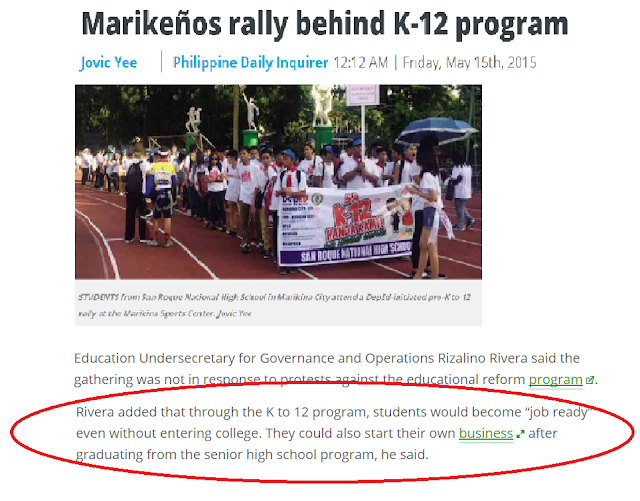DepEd K to 12 Graduates Could Start Their Own Business, Seriously?
 |
| Above copied from the Inquirer |
Does entrepreneurship education (E-ed) really work to create business enterprise? We conducted a comprehensive review and methodological critique of the empirical research on the outcomes of university-based E-ed. We identified every empirical study conducted over the past decade, and found 12 that minimally met our methodologically “robust” (Storey Steps 4–6) standard. Our systematic critique of the studies' research methods found a variety of methodological weaknesses, undermining confidence in the belief that E-ed can produce entrepreneurship. The implications for both practice and policy are discussed, and recommendations are made for conducting future E-ed outcome research.This is in higher education where results are clearly inconclusive. Starting a business, of course, requires so many factors beside education. In "Why are some people more likely to become small-businesses owners than others: Entrepreneurship entry and industry-specific barriers", published in the Journal of Business Venturing, the following table shows one of the important factors, capital:
Table A1.
Mean years of schooling and business equity by industry.
Source: 1996 and 2001 SIPP panels.
DepEd has been defending its K to 12 curriculum against its critics. The defense is nothing but a misinformation campaign. DepEd secretary Luistro even goes as far as issuing the following challenge:
"We're building the classrooms now. What will we do with the 30,000 classroooms and the other classrooms that private schools have already built? I will ask those who will try to stop it to please solve the problem on how to address the investments that have already been put in."Actually, these should not be perceived as investments. These are in fact the much needed resources of the old ten-year curriculum. Classrooms are not going to waste even if the new curriculum does not push through. The new modules and various mass training are indeed going to waste. These, however, have long been of no value since the modules are of poor quality and the training is largely ineffective.

Comments
Post a Comment